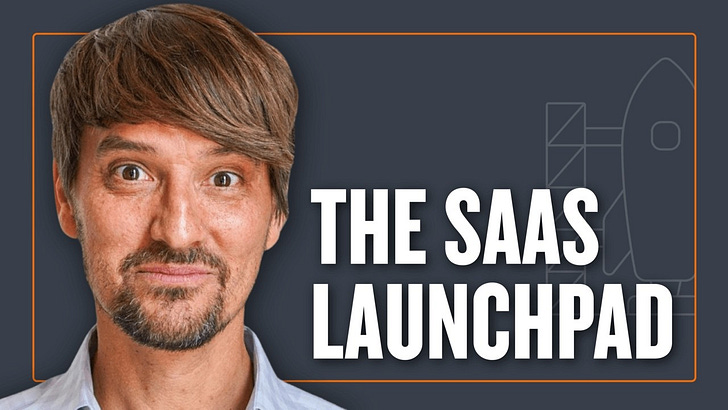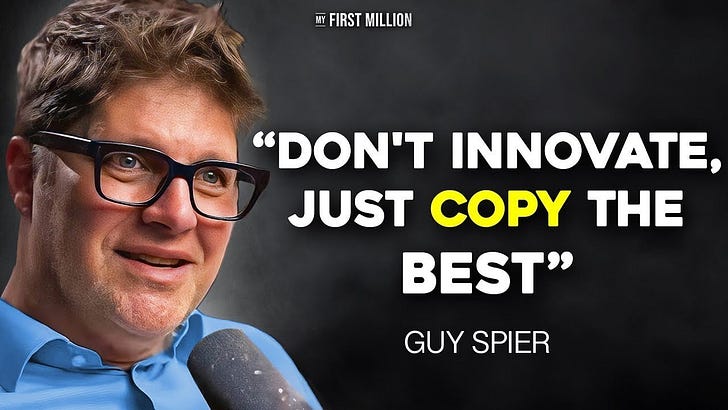"1. My First Muscle Fitness Challenge
2. Make Videos That Pop Out
3. Business Coaching
4. Building AI startups on top of OpenAI
5. Building AI apps on top of OpenAI
6. Proprietary Data and AI
7. Building AI companies with themes from Web 1.0
"
[0.00] My First Million_The Announcement You've Been Waiting For.txt
My First Million
The Announcement You've Been Waiting For
"## 1. BUSINESS IDEA - My First Muscle Fitness Challenge
[YouTube Link:
This business idea is a fitness challenge called \"My First Muscle\", targeting individuals who are addicted to podcasts and neglecting their physical health. The challenge consists of completing 100 push-ups, 100 air squats, and 100 burpees, with participants encouraged to time themselves and share their results. The goal is to provide a simple and accessible fitness challenge that can combat the sedentary lifestyle often associated with excessive podcast consumption, humorously referred to as \"pod bod\". The idea leverages the popularity of the \"My First Million\" podcast to reach a large audience and inspire participation.
"
[43.73] My First Million_How To Master Short Form Content.txt
My First Million
How To Master Short Form Content
"**-BUSINESS IDEA- 1- Make Videos That Pop Out**
[YouTube Link:
The speakers discuss the importance of creating videos that are visually appealing and attention-grabbing. They suggest using bright colors, high saturation, and special effects to make videos pop out. They give an example of adding artificial fire to a video to make it look more exciting. They also mention the use of visual effects to enhance the impact of a scene, such as making a small dent in a wall look like a giant hole.
"
[78.03] Noah Kagan_How Mark Zuckerburg Became Successful.txt
Noah Kagan
How Mark Zuckerburg Became Successful
"## BUSINESS IDEA-1: Business Coaching
[YouTube Link:
Even highly successful individuals like Mark Zuckerberg see the value in having a coach. Zuckerberg, despite his vast knowledge and resources, recognized the need for guidance and mentorship. He sought out a business coach, highlighting the importance of having an objective perspective and someone to hold you accountable. This concept extends to professional athletes and other high achievers who rely on coaches to refine their skills and reach their full potential. Bill Campbell, a renowned business coach, exemplified this by mentoring industry titans like Steve Jobs, Larry Page, and Eric Schmidt. The key takeaway is that learning from others\' experiences and seeking guidance can be instrumental in achieving success, regardless of your current level of expertise.
"
[133.67] Noah Kagan_Why Patrick Bet-David Hired Ronaldo’s Coach To Train His Son ⚽️.txt
Noah Kagan
Why Patrick Bet-David Hired Ronaldo’s Coach To Train His Son ⚽️
"## **BUSINESS LEARNING - 1** - How much do top coaches charge?
[YouTube Link:
This segment discusses the high cost of coaching from top professionals, using the example of a soccer coach who trains Cristiano Ronaldo\'s son. The coach, flown in from Brazil, charges a premium for his services due to his reputation and expertise. Interestingly, the coach also leverages his connection to Ronaldo\'s son to scout and potentially recruit other talented young players like Dylan, the speaker\'s son. This highlights how top coaches can command high fees and use their network to identify and attract promising talent. The example underscores the value placed on specialized knowledge and connections within specific fields, even for something like youth sports.
"
[187.70] a16z_Build Your Startup With AI.txt
a16z
Build Your Startup With AI
"## 1. BUSINESS IDEA - Building AI startups on top of OpenAI
[YouTube Link:
This section discusses the challenges and opportunities for startups building on top of large foundation models like those offered by OpenAI. The speakers acknowledge that competing head-on with giants like OpenAI is difficult due to their massive resources. However, they highlight several nuances and opportunities for startups to succeed:
* **Architectural differences and specialization:** Startups can focus on developing models specialized for specific domains, performance characteristics, or architectural nuances, offering unique value propositions.
* **Model distillation:** Startups can \"distill\" knowledge from larger models into smaller, more efficient versions tailored to specific applications, reducing cost and complexity.
* **Integration with existing platforms:** Combining AI capabilities with existing platforms like Databricks creates unique solutions for enterprise customers needing tailored models.
* **Developer hooks and rapid iteration:** Startups like 11 Labs have successfully embedded their specialized models into existing AI stacks, gaining widespread adoption and benefiting from rapid iteration in their niche.
The speakers emphasize that startups need to carefully consider if improvements in base models will benefit or threaten their business. They advise against directly competing with OpenAI on general-purpose capabilities and instead focus on areas where differentiation and specialization are possible.
## 2. BUSINESS IDEA - Building AI apps on top of OpenAI
[YouTube Link:
This section addresses the concern that AI apps built on top of large language models (LLMs) risk being commoditized as the underlying LLMs improve. The speakers acknowledge this risk but argue that it\'s similar to calling all software apps \"database wrappers,\" which doesn\'t diminish their value. They highlight several factors that contribute to the viability of AI app companies:
* **The \"correctness gap\" and the need for humans in the loop:** LLMs still lack perfect accuracy and require human oversight for critical tasks. AI apps can bridge this gap by integrating human expertise and workflows.
* **Domain expertise and process flow integration:** AI apps can incorporate specific domain knowledge and business processes, exceeding the capabilities of general-purpose LLMs.
* **Value-based pricing:** AI apps can capture significant value by addressing specific business problems and charging based on the value provided, rather than just the cost of development.
The speakers emphasize that successful AI apps will focus on bridging the gap between LLM capabilities and real-world business needs. They argue that understanding customer workflows, integrating domain expertise, and focusing on value creation are crucial for building sustainable AI app companies.
## 3. BUSINESS IDEA - Proprietary Data and AI
[YouTube Link:
This part delves into the role of proprietary data in AI, challenging the common belief that \"data is the new oil.\" The speakers argue that while data is critical for training AI, simply possessing proprietary data doesn\'t guarantee a competitive advantage. They highlight several reasons for this:
* **Vastness of internet data:** The internet offers a massive and diverse data pool that often surpasses the value of proprietary datasets held by individual companies.
* **Lack of a robust data marketplace:** The absence of a large, sophisticated market for data suggests that its standalone value is often overestimated.
* **Data as a competitive tool, not a product:** Companies like Meta and Andreessen Horowitz have successfully leveraged their data to improve internal processes and product offerings, demonstrating data\'s value lies in its strategic application.
The speakers emphasize that companies should focus on using their data to enhance their own operations and competitiveness rather than relying on it as a sellable asset. They caution against sharing sensitive data with large AI companies and advocate for responsible data usage. The discussion also touches upon ethical considerations surrounding genetic data in insurance and potential societal implications of perfectly predictive healthcare data.
## 4. BUSINESS IDEA - Building AI companies with themes from Web 1.0
[YouTube Link:
This segment explores the parallels between the current state of AI and the early days of the internet (Web 1.0). The speakers challenge the direct comparison, arguing that AI is more analogous to the development of the computer or microprocessor than the network-centric nature of the internet. They highlight several key differences and lessons learned:
* **AI as a computer, not a network:** AI functions more like an information processing system than a network, with a focus on computation rather than connectivity. This suggests different industry dynamics and competitive forces at play.
* **Boom-bust cycles and speculative bubbles:** The history of technological advancement is marked by speculative bubbles, fueled by excitement and uncertainty around new technologies. The speakers acknowledge the potential for a similar cycle in AI but argue that it\'s an unavoidable part of innovation and growth.
* **Lessons from the internet era:** The speakers emphasize the importance of embracing experimentation and failure as part of the venture capital model, acknowledging that predicting successful use cases upfront is nearly impossible. They also highlight the benefits of openness and caution against over-regulation that could stifle innovation and create monopolies.
The discussion emphasizes that while the internet boom provides some valuable lessons, AI\'s development path will likely differ due to its fundamental nature as a computer rather than a network. The speakers advocate for a balanced approach that embraces the potential of AI while navigating the inevitable hype cycles and fostering a spirit of innovation.
"











